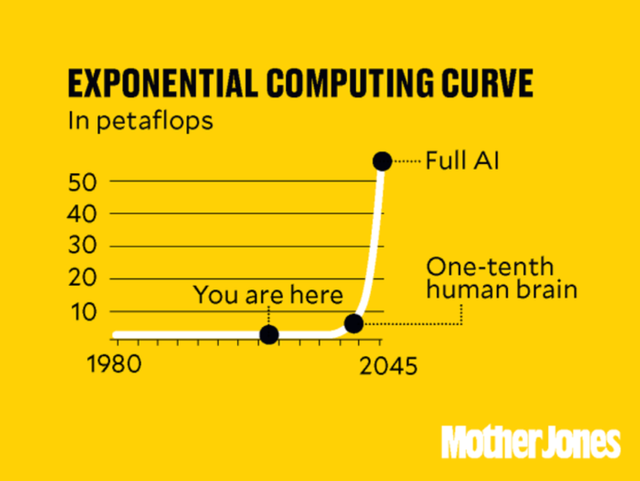Future of Robot and AI
In a recent article, Kevin Drum makes a compelling argument that You Will Lose Your Job to a Robot — and Sooner Than You Think. The piece is a little long, but this is a must read for everyone. At the heart of his argument lies the exponential progression of artificial intelligence (AI). Using the human brain as a barometer, AI will reach one tenth the power of the human brain by 2035. By 2045, we will have full human level AI.
The author responds to AI skeptics and their disbelief in the notion of significant technological unemployment. Here are the common doubts addressed (check out the article for the authors response):We’ll never get true AI because computing power won’t keep doubling forever. We’re going to hit the limits of physics before longEven if computing power keeps doubling, it has already been doubling for decades. You guys keep predicting full-on AI, but it never happensOkay, maybe we will get full AI. But it only means that robots will act intelligent, not that they’ll really be intelligentWaves of automation — steam engines, electricity, computers — always lead to predictions of mass unemployment. Instead they just make us more efficient. The AI Revolution will be no differentAs Mr. Drum explores a future where the meaning of work changes, he describes the four basic categories of work, and the likelihood that AI will replace the category:Routine physical: digging ditches, driving trucksRoutine cognitive: accounts-payable clerk, telephone salesNonroutine physical: short-order cook, home health aideNonroutine cognitive: teacher, doctor, CEOThe author describes a future where routine jobs will be the first to go, and by 2060, all non-routine jobs will follow. Although 2060 seems far away, the employment apocalypse happens much sooner. As AI takes over, the role of work in society will change.The author posits that one way or another, the answer to the mass unemployment of the AI Revolution involves some kind of sweeping redistribution of income that decouples it from work. Or a total rethinking of what “work” is. Or a total rethinking of what wealth is. He explores some possibilities:
- The welfare state writ large
- Universal basic income #1
- Universal basic income #2
- A tax on robots
- Socialization of the robot workforce
- Progressive taxation on a grand scale
- Wealth tax
The author correctly suggests that the topic is not getting the proper level of political discourse, and provides his own point of view on the political aspects of this discussion. No matter where you fall on this very polarizing topic, educating ourselves is the best path towards creating a prosperous future.
Source: https://medium.com/@frankdiana/will-a-robot-take-your-job-440dea529bc1
